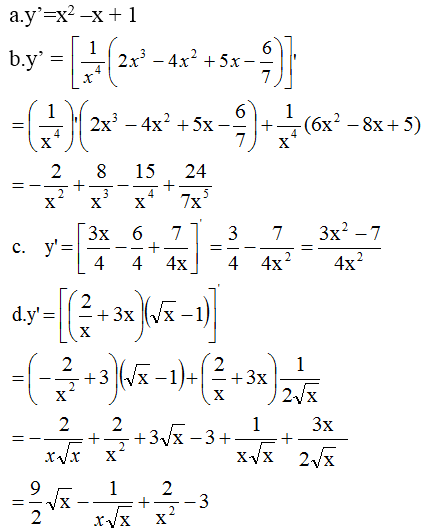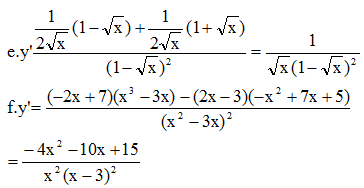Hãy nhập câu hỏi của bạn vào đây, nếu là tài khoản VIP, bạn sẽ được ưu tiên trả lời.

3.
Hàm trùng phương \(f\left(x\right)=ax^4+bx^2+c\) với \(a\ne0\) đồng biến trên \(\left(0;+\infty\right)\) khi và chỉ khi:
\(\left\{{}\begin{matrix}a>0\\b\ge0\end{matrix}\right.\) \(\Leftrightarrow m\ge0\)
Hoặc giải bt: \(y'=4x^3+2mx\ge0\) ;\(\forall x>0\)
\(\Leftrightarrow2x\left(x^2+m\right)\ge0\)
\(\Leftrightarrow x^2+m\ge0\)
\(\Leftrightarrow x^2\ge-m\)
\(\Leftrightarrow-m\le min\left(x^2\right)=0\Rightarrow m\ge0\)
1.
Giả sử tiếp tuyến d có 1 vtpt là \(\left(a;b\right)\) với \(a^2+b^2>0\)
\(\Rightarrow cos30^0=\frac{\sqrt{3}}{2}=\frac{\left|a-2b\right|}{\sqrt{\left(a^2+b^2\right)\left(1^2+\left(-2\right)^2\right)}}=\frac{\left|a-2b\right|}{\sqrt{5\left(a^2+b^2\right)}}\)
\(\Leftrightarrow4\left(a-2b\right)^2=15\left(a^2+b^2\right)\)
\(\Leftrightarrow11a^2+16ab-b^2=0\)
Nghiệm xấu quá nhìn muốn nản, bạn tự làm tiếp :)
2.
\(y'=cosx-2sinx+2m-5\)
Hàm số đồng biến trên TXĐ khi và chỉ khi \(y'\ge0\) ; \(\forall x\)
\(\Leftrightarrow cosx-2sinx+2m-5\ge0\) ;\(\forall x\)
\(\Leftrightarrow2m-5\ge2sinx-cosx\)
\(\Leftrightarrow2m-5\ge f\left(x\right)_{max}\) với \(f\left(x\right)=2sinx-cosx\)
Ta có: \(f\left(x\right)=2sinx-cosx=\sqrt{5}\left(\frac{2}{\sqrt{5}}sinx-\frac{1}{\sqrt{5}}cosx\right)=\sqrt{5}sin\left(x-a\right)\)
Với \(a\in\left(0;\pi\right)\) sao cho \(cosa=\frac{2}{\sqrt{5}}\)
\(\Rightarrow f\left(x\right)\le\sqrt{5}\Rightarrow2m-5\ge\sqrt{5}\Rightarrow m\ge\frac{5+\sqrt{5}}{2}\)

Bài 5. Cosx = ![]() là phương trình xác định hoành độ giao điểm của đường thẳng y =
là phương trình xác định hoành độ giao điểm của đường thẳng y = ![]() và đồ thị y = cosx.
và đồ thị y = cosx.
Từ đồ thị đã biết của hàm số y = cosx, ta suy ra x = ![]() , (k ∈ Z), ( chú ý tìm giao điểm của đường thẳng cới đồ thị trong đoạn [-π ; π] và thấy ngay rằng trong đoạn này chỉ có giao điểm ứng với
, (k ∈ Z), ( chú ý tìm giao điểm của đường thẳng cới đồ thị trong đoạn [-π ; π] và thấy ngay rằng trong đoạn này chỉ có giao điểm ứng với ![]() rồi sử dụng tính tuần hoàn để suy ra tất cả các giá trị của x là x =
rồi sử dụng tính tuần hoàn để suy ra tất cả các giá trị của x là x = ![]() , (k ∈ Z)).
, (k ∈ Z)).

a) =
=
.
b) =
=
.
c) =
=
.
d) y' =\(\dfrac{\left(x^2+7x+3\right)'\left(x^2-3x\right)-\left(x^2+7x+3\right)\left(x^2-3x\right)'}{\left(x^2-3x\right)^2}\)=\(\dfrac{\left(2x+7\right)\left(x^2-3x\right)-\left(x^2+7x+3\right)\left(2x-3\right)}{\left(x^2-3x\right)^2}\)=\(\dfrac{-2x^2-6x+9}{\left(x^2-3x\right)^2}\)


Lời giải:
\(y'=\frac{2}{3}x+m\geq 0, \forall x\in\mathbb{R}\Leftrightarrow m\geq -\frac{2}{3}x, \forall x\in\mathbb{R}\)
\(\Leftrightarrow m\geq \max (\frac{-2}{3}x), \forall x\in\mathbb{R}\)
Vì $\frac{-2}{3}x$ không có max với mọi $x\in\mathbb{R}$ nên không tồn tại $m$